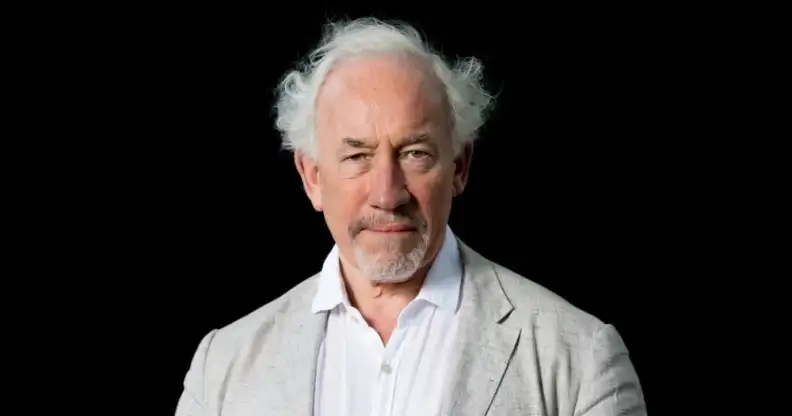Veteran actor Simon Callow slammed for ‘grim’ attack on Stonewall and trans self-ID

English actor Simon Callow pictured at the Edinburgh International Book Festival in 2017 (Roberto Ricciuti/Getty)
Veteran gay actor Simon Callow has attacked Stonewall for taking a “tyrannical” and “dangerous” stance on the self-identification of trans people.
Callow, best known for his role in Four Weddings and a Funeral, condemned the leading LGBT+ charity in an article for The Times on Wednesday (25 August).
The 72-year-old described Stonewall’s stance as “extraordinarily unproductive militancy”, claiming it could infringe on women’s rights and pressure young gay people to transition.
“They have taken a very strange turn towards the tyrannical, a dangerously prescriptive position on a complex issue,” he said. “When it impinges on women’s rights, hard-won women’s rights, the right to exclusive spaces for women, away from any threat at all – I think that’s a very serious issue.”
Callow raised concern about the idea of “children” transitioning, citing “a number of cases of people who have regretted it deeply”.
Multiple studies have shown that detransition is an issue affecting less than one per cent of those who transition. Research by the University of Cambridge found that 0.6 per cent of patients expressed regret at transitioning, while a study from the Nottingham Centre for Transgender Health reported just 0.47 per cent.
In any case, the only medication available in the UK to under-16s experiencing gender dysphoria are puberty blockers, which are reversible and “extensively, powerfully” regulated by courts and medical professionals.
Yet Simon Callow seems to think many trans youth may be “just gay” and “somehow lured into thinking that they are obviously in the wrong gender, which is not the case”.
“It has created oppositions which should not be there at all,” he suggested.
The actor complained about the reaction these comments would stir up, saying it was a “sign of the times” that he should face consequences for expressing such controversial views.
“I shouldn’t have to fear in that way,” he said. “This is just tyranny and that’s what we’ve fought against all our lives, people saying, ‘This cannot be discussed.’ Yes, it can be discussed. Everything can be discussed.
“I’ve always been perfectly prepared to discuss homosexuality with anyone on reasonable terms. I can form a conclusion about a person’s attitudes but I don’t for one second think they shouldn’t have them.”
Stonewall stood by its support for trans people, telling The Times: “We are working towards a world in which all lesbian, gay, bi, trans and queer people are able to thrive as themselves.
“We’re very proud of our work towards trans equality, as well as our work for all lesbian, gay, bi and queer people. From LGBTQ+ inclusive education to equity in healthcare, our work helps all LGBTQ+ people.”
Does Simon Callow speak for the LGBT+ community?
The Times describes Simon Callow as a “veteran gay rights campaigner” who was involved in the anti-government protests that led to the foundation of Stonewall in 1989.
Yet Callow’s claims of “militancy” from Stonewall drew stark comparisons with the rhetoric used by homophobic journalists of the 80s and 90s, who frequently described LGBT+ activists as “militant homosexuals” and their fight for rights as a “militant campaign”.
This parallel was highlighted by the queer researcher Tabitha McIntosh, who cited multiple examples on Twitter. “If you are old enough to remember the 1980s, ‘militancy’ is an extraordinarily loaded word,” she said.
Here is an editorial from The Independent in September 1990 explaining that “militant homosexuals are not generally a good advertisement for their cause.” The militancy in question was *kissing* pic.twitter.com/5C8uqtNIDB
— Tabitha McIntosh ? (@TabitaSurge) August 25, 2021
McIntosh also noted Callow’s own comments to The Independent in 1996, in which he sets himself apart from Stonewall founder and fellow actor Ian McKellen.
“Ian is by nature a leader and a spokesman, and I’m not either of those things,” he said. “Although I’ve lent my name and support to organisations like the Terrence Higgins Trust, I’m not militant.
“I haven’t led or joined marches. I don’t like it, and I won’t do it for anyone.”
Gay journalist Owen Jones condemned Callow for his comments in The Times, remarking how the “onslaught against trans people mirrors the onslaught against gay people”.
“There’s a long and tragic history of members of minorities who’ve won greater acceptance kicking their ladder from beneath them. That’s what Simon Callow is doing, and it’s grim,” he said.
PinkNews has contacted Simon Callow for comment.

